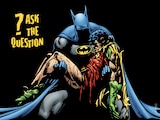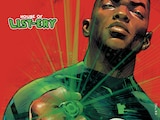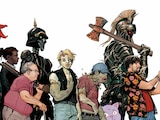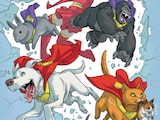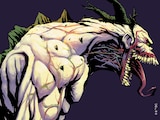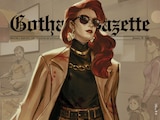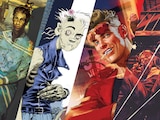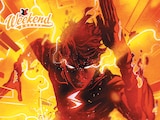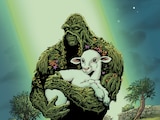Superheroes have an interesting relationship with tragedy. When you look at most superhero origins, there is usually a personal tragedy that kicks off the narrative. Superman lost his planet, Batman lost his parents, Swamp Thing’s wife was murdered, and Cyborg lost his mother. If a hero doesn’t experience a tragedy in their origin, there is a high chance that they’ll experience a huge personal loss at some point in their story.
However, there is something different about Tatsu Yamashiro, who has an unusual relationship with tragedy. Like many other DC heroes, Katana lost her family. However, unlike other heroes, Tatsu’s sword holds the soul of her departed husband.
There have been a few versions of Katana’s origin over the years, but most of them follow the basic backstory that was introduced in 1984’s Batman and the Outsiders #12. Years before she was Katana, Tatsu was in the middle of a love triangle between two brothers named Maseo and Takeo. Tatsu chose Maseo, and the two married. Two children named Reiko and Yuki came shortly thereafter.

Takeo became consumed by jealousy and attacked his brother with the Soultaker, a supernatural sword that trapped the souls of anyone it killed. At the same time, a fire started which took the lives of Reiko and Yuki. In a matter of minutes, Tatsu lost her entire family. But in a twist, she was able to get the Soultaker from Takeo, which she used as an instrument of revenge, adopting the name of Katana in the process.
Since Maseo had been slain with the Soultaker, his soul remained trapped inside her blade. Due to this, Katana has an interesting relationship with her weapon, as well as the concept of grief. How do you move on when you’re carrying a piece of your tragedy with you? There is also something poetic (and tragic) about wielding the weapon that murdered your husband. Even the name Katana is a reference to the blade. It’s as if Tatsu has based her entire identity around that tragic night.
Ann Nocenti’s 2013 Katana series explores the relationship Tatsu has with the Soultaker. Since her husband’s soul is resting inside the blade, Tatsu has an unhealthy fixation on it. She sleeps with the sword every night. In Katana #1, Tatsu awakes from a dream where she’s intimate with another man, and immediately apologizes to the Soultaker. “Please forgive me. You are the only one welcome in my bed,” Tatsu says as she cradles the sword.

Of course, she’s not addressing the weapon. She’s speaking to Maseo’s soul, which is trapped inside the blade. This gives Tatsu a different kind of dependence on the sword. In Katana #3, we see Tatsu ask the Soultaker for guidance when she faces an important crossroads. When the souls in the sword don’t give her an encouraging answer, Tatsu is shattered.
“What?” she questions. “How can you say that, Maseo? Please don’t tell me that. I love you.”
Other stories portray Tatsu as more detached. The Other History of the DC Universe #3 has Tatsu recalling a conversation with Gabrielle Doe, the heroine known as Halo.
“When I was drunk, I cried a lot,” Tatsu recalls. “I told her not to feel bad about that. I was crying for my family, and the truth was I had not cried for them in a long, long time, and crying felt good.”

This statement could mean many things. Perhaps Tatsu was hiding from her feelings of grief and it took alcohol to confront them. It also might seem like a contradiction to Nocenti’s earlier series. That version of Tatsu cried regularly and treated the Soultaker as if it was her husband. This isn’t a contradiction, it’s simply a truth of grieving.
Grief is not a straight line. There are times when you will feel better and times when you feel like falling apart. In Mike W. Barr’s Batman and the Outsiders, we see Tatsu begin to put herself back together. After devoting her entire existence to vengeance, she learns that she can build a second life. It doesn’t mean Tatsu has forgotten her family. Just that it’s possible to begin living again.
Batman, who is no stranger to grief, recognizes what Tatsu needs. In Batman and the Outsiders #3, he entrusts Katana with the care of the teenage Halo. The other Outsiders questioned Batman’s motives, wondering if Tatsu is a suitable role model, but Batman comments that it’s precisely what Tatsu needs. The Dark Knight is likely remembering his own experience with Dick Grayson, and how it’s helped him. Furthermore, Batman was right. Katana’s relationship with Halo in Batman and the Outsiders would allow both of them to learn, grow and heal.

But while Katana may have built a new life, she still holds onto pieces of her old one. She still wields the Soultaker, the weapon that killed her husband and contains his soul. How can she ever move on when that weapon remains an essential part of her identity?
The truth is, we all hold our own Soultakers. We may not carry our deceased loved ones’ souls inside of a weapon, but we all hold onto them in our own ways. Katana could throw the Soultaker in a dumpster tomorrow and it wouldn’t make a difference. She would still carry her grief for Maseo with her every day. The honest truth is that despite the mask, sword and vigilante lifestyle, Katana’s relationship with grief isn’t that different from any of our own.
I recently recalled a conversation with a friend of mine who lost her child. We were grieving another death, and she shared some invaluable insight: “It doesn’t get any easier, but it does get easier to carry,” she told me.
She was right. Every time Tatsu wields the Soultaker, she’s channeling all her grief. The grief will never get easier for Tatsu, but it does get easier to carry.
Joshua Lapin-Bertone writes about TV, movies and comics for DC.com, is a regular contributor to the Couch Club and writes our monthly Batman column, "Gotham Gazette." Follow him on Twitter at @TBUJosh.
NOTE: The views and opinions expressed in this feature are solely those of Joshua Lapin-Bertone and do not necessarily reflect those of DC or Warner Bros. Discovery, nor should they be read as confirmation or denial of future DC plans.


